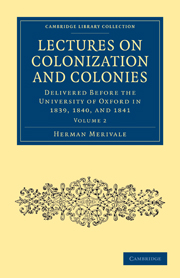 Lectures on Colonization and Colonies
Lectures on Colonization and Colonies Let us proceed to investigate very briefly the causes and character of the economical progress of colonies in what may be called their second or adolescent stage, when they are already established as communities, and before they have attained that density of population which characterizes old states.
I need not repeat what has been so often urged in these lectures, that the cause which impels adventurers to the foundation of new colonies, and the reward of the exertions of the emigrant, is the increased productiveness of labour when applied to a new soil. The labour of every man in the colonies, said Sir Josiah Child in the early days of our American plantations, is four times as valuable as if he had remained at home. The industry of those who go into a foreign plantation, says William Penn, is worth more than if they remained here, “the product of their labour being in “commodities of a superior nature to those of this “country;” that is, greater either in amount or value. According to a calculation of Humboldt, the return of wheat in Prussia in his time might be estimated at 4 or 5 to 1; in France, on the average, at 5 or 6 to 1; in the best soils, 13 to 1; in La Plata, 12 to 1; the North of Mexico, 17 to 1; Peru, 18 to 1: equinoxial Mexico, 24 to 1.
To save this book to your Kindle, first ensure [email protected] is added to your Approved Personal Document E-mail List under your Personal Document Settings on the Manage Your Content and Devices page of your Amazon account. Then enter the ‘name’ part of your Kindle email address below. Find out more about saving to your Kindle.
Note you can select to save to either the @free.kindle.com or @kindle.com variations. ‘@free.kindle.com’ emails are free but can only be saved to your device when it is connected to wi-fi. ‘@kindle.com’ emails can be delivered even when you are not connected to wi-fi, but note that service fees apply.
Find out more about the Kindle Personal Document Service.
To save content items to your account, please confirm that you agree to abide by our usage policies. If this is the first time you use this feature, you will be asked to authorise Cambridge Core to connect with your account. Find out more about saving content to Dropbox.
To save content items to your account, please confirm that you agree to abide by our usage policies. If this is the first time you use this feature, you will be asked to authorise Cambridge Core to connect with your account. Find out more about saving content to Google Drive.